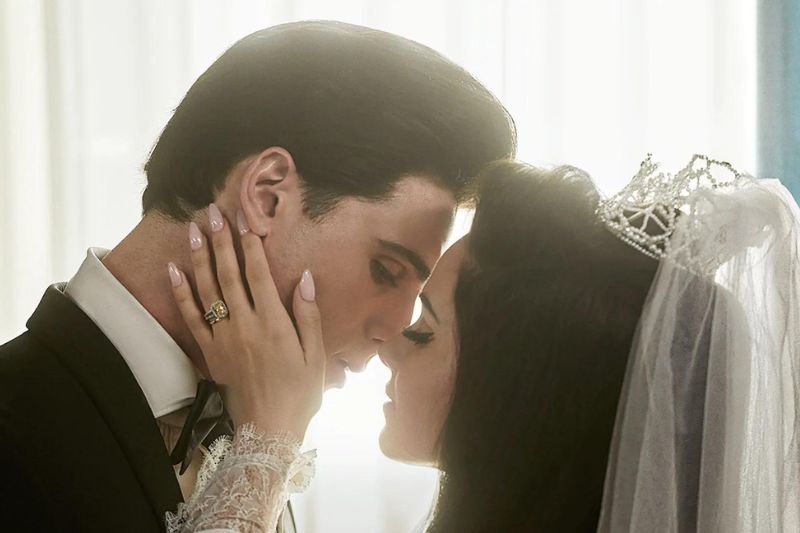Elvis has transfixed fans and dominated popular culture since his rise to stardom in 1955, while Priscilla Presley has historically hovered in the wings, an untapped well of interest. Or so Sofia Coppola thinks, whose latest biopic Priscilla focuses on the King of Rock’n’Roll’s queen. Priscilla has made fearless revelations about life inside Graceland. She has effectively demanded a public reappraisal of their relationship, establishing herself in the role of executive producer on this biopic, which draws from her 1985 memoir Elvis and Me. So, Coppola turns the mythic pairing on its head.

The couple met in 1959 at the U.S. army barracks in West Germany, where Elvis was stationed at the same time as Priscilla’s father. He was already a music superstar by the time he completed his military service, with songs like One Night and I Got Stung having topped the charts. Priscilla, then 14-years-old, was instantly infatuated.
It’s impossible now to overlook that Priscilla was underage when she met Elvis. It’s hard to imagine what any 24-year-old’s intentions could be with a schoolgirl 10 years his junior, if not sinister. After lengthy separations caused by Elvis’s military and career responsibilities, the pair ultimately convinced Priscilla’s parents to allow her to relocate to Memphis, purportedly to live with Elvis’s father and stepmother near the Graceland estate, where she would finish her final year at a nearby school.
With the value of hindsight, Priscilla writes in her memoir of the power imbalance in her relationship with Elvis. He was temperamental and controlling, instructing her on her appearance and behaviour while he continued affairs with other women. Relative newcomer Cailee Spaeny is a revelation in the role of Priscilla under Coppola’s accomplished direction, maturing from a fragile naïveté to weariness to a kind of wisdom. There’s an under-the-skin discomfort to watching the young teen forced into early maturation and transformation by this imbalanced relationship.
Coppola’s version of Priscilla is as a prop in Elvis’s world. There’s a stand-out scene in which the family is being photographed, a rigid Elvis standing behind Priscilla and their baby, which illustrates this dynamic of inequality with poetic power. Cinematographer Philippe Le Sourd, in his fourth collaboration with Coppola, has Spaeny placed deep within the re-created environment, making Priscilla a decoration of sorts, dominated by her partner. The pastel hues convey the deceptiveness of glossy appearances with chilling effect. This particular tone of bland, empty beauty will be familiar from Coppola’s The Virgin Suicides and Marie Antionette. Priscilla is in much the same vein, and belongs with them as examples of her finest work.
'It’s still a tragedy, and a depressing one at that. You tend to expect this if you’re familiar with Coppola’s work, but this time she barely escapes the monotony of melancholy.'
Several montages track Priscilla’s fall into adulthood and celebrity. Her journey is everywhere dictated by Jacob Elordi’s Elvis: this dress, not that one; hair higher, black eyeliner to make the fullest impact. It’s an eerie depiction of an individual’s persona that is not quite her own. Elvis feigns admiration only to belittle her, to close the world around her to the point of suffocation. Retroactive perspective burdens what Priscilla herself describes as a ‘love story’ with a significant predatory dynamic.
Revelations of these behaviours and recent reassessments of the King’s legacy have to some extent tarnished the crown. The film gestures to the reckoning of a number of Hollywood giants that has exploded in recent years with cancel culture and the ‘Me Too’ movement. Elvis’s drug addictions, gambling and aggressive outbursts recall figures like Johnny Depp and Bill Crosby. These days, behaviour in private seems to count for as much as talent and influence in how someone is remembered.
Giving birth to their daughter grounds Priscilla. It has the same effect on Coppola’s Marie Antionette, who also finds refuge in the maternal role. But Coppola extends Priscilla’s horizons further than the French queen’s. Her wardrobe is transformed as she learns to dress as a self-determined person, swapping her engineered signature style for blue jeans and casual tops. She tells Elvis, ‘You’re losing me to a life of my own’, and it’s an act of reclamation that makes us want to cheer. The severing of their trajectories is her triumph and his tragedy, and as an audience we’re for her. Still, it’s tragic that Elvis would die just four years after their divorce.
Though often bleak, the film ebbs and flows with shifts in energy and tone. The soundtrack — which features no Elvis Presley songs — balances the romantic despair and feverish excitement of life with Elvis. It’s still a tragedy, and a depressing one at that. You tend to expect this if you’re familiar with Coppola’s work, but this time she barely escapes the monotony of melancholy. Priscilla is captivating and it has moments of brilliance, but in the end, Coppola has made you wonder if you ever cared about Priscilla or Elvis.
Eddie Hampson is a literary and film critic.
Main image: Courtesy of A24